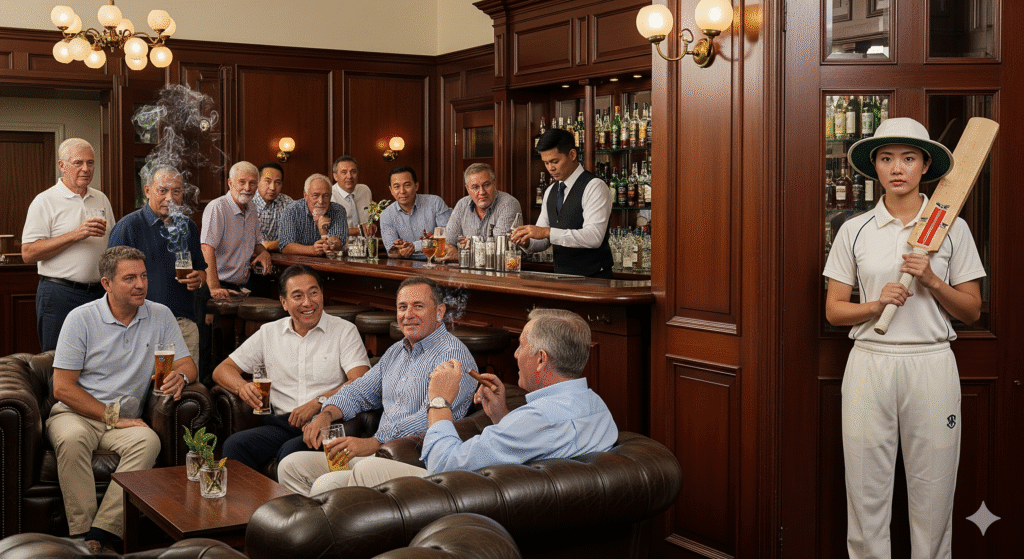It was meant to be a simple name change at one of Singapore’s oldest clubs. Instead, it turned into a culture war with beer taps. The Singapore Cricket Club (SCC), founded in 1852 and nestled grandly on the Padang, held a special general meeting where members voted—by the slimmest of margins—to keep calling one of its bars the “Men’s Bar.” The proposal to rename it to something gender-neutral like “1852” or “Captain’s Bar” was rejected by 53.49 percent of members, reaffirming that even in a city that prides itself on progress, the ghosts of colonial-era exclusivity can still raise a toast.
The debate over a bar’s name might seem trivial, but for the SCC it’s a mirror reflecting how heritage and modernity continue to spar beneath the polished teak and brass. The “Men’s Bar” is, after all, a relic from the club’s gentlemen-only days. Women were first admitted as full members only in 1996, and allowed to enter the Men’s Bar itself a full decade later, in 2006. For some members, this history is precisely what makes the name worth keeping. To them, “Men’s Bar” is not about gender exclusion, but nostalgia—a nod to the club’s 19th-century roots and its identity as one of Singapore’s oldest social institutions. The bar, they argue, is already open to everyone; changing the name would erase tradition for the sake of political correctness. Others see it quite differently. To women members and their allies, the name is a lingering reminder of a not-so-distant past when equality wasn’t served alongside the gin and tonic. Zaibun Siraj, a veteran activist and former president of AWARE Singapore, has been one of the most outspoken voices calling for change. She told The Straits Times that “the name does not reflect the values of Singapore today. It does not show fairness and respect to the women members.” Her point is hard to miss: in a club that now claims inclusivity, why should one of its most visible spaces still announce itself as belonging to men?
This wasn’t the first skirmish. In 2024, members had actually voted by a narrow 51.98 percent to rename the venue “1852 – The Heritage Bar,” only for another vote in April 2025 to overturn that decision, reinstating “Men’s Bar” with a solid 68.77 percent majority. The latest meeting was yet another attempt to settle the matter once and for all. A related resolution was even proposed—to ensure no club facility would ever again bear a name referencing gender, race, or religion. That, too, failed. In a small gesture of compromise, a plaque acknowledging the bar’s historical origins did get approved. But symbolism can only go so far when the symbol itself is contested.
The SCC’s official line is that the name is “steeped in heritage” and part of the club’s “distinctive identity.” It insists the club welcomes all members equally, regardless of gender. Yet critics point out that the word “Men” on the door speaks louder than any press release. “It implicitly suggests that men are still favoured in this club,” one group of members argued in a letter circulated before the vote, according to Mothership.sg. For younger and more diverse members, the debate over a name is about more than semantics; it’s about whether the club sees itself as a living community or a museum of privilege. For a city that constantly reinvents itself, Singapore’s elite clubs often move at glacial speed. The SCC, with just over 4,000 members, reflects a broader tension familiar to institutions across the world: how to honour history without being hostage to it. The “Men’s Bar” controversy, like debates over colonial statues or exclusive dress codes, isn’t just about words—it’s about who gets to define belonging.
For now, the decision stands. The bar will remain the “Men’s Bar,” the name gleaming above the counter like a stubborn echo from the past. The club promises it remains inclusive, and perhaps it does. Yet in the eyes of many, the refusal to rename it speaks volumes about who still holds the majority in Singapore’s old boys’ circles. As Zaibun Siraj said, she’ll try again next year. Whether she’ll succeed is anyone’s guess, but one thing is certain: at the SCC, tradition still has the upper hand—and it’s not ready to buy the next round.

